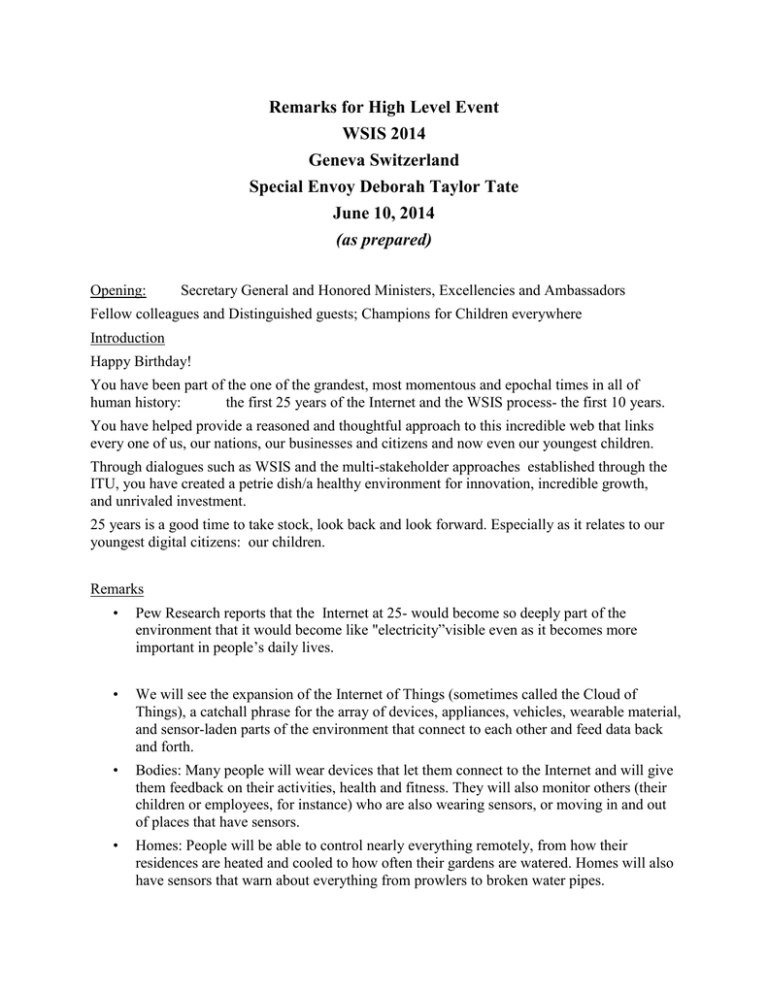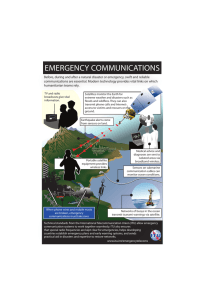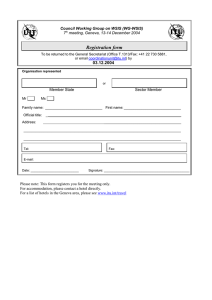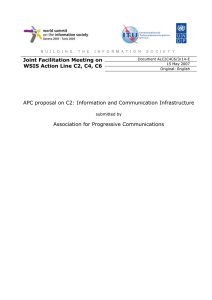Remarks for High Level Event WSIS 2014 Geneva Switzerland
advertisement

Remarks for High Level Event WSIS 2014 Geneva Switzerland Special Envoy Deborah Taylor Tate June 10, 2014 (as prepared) Opening: Secretary General and Honored Ministers, Excellencies and Ambassadors Fellow colleagues and Distinguished guests; Champions for Children everywhere Introduction Happy Birthday! You have been part of the one of the grandest, most momentous and epochal times in all of human history: the first 25 years of the Internet and the WSIS process- the first 10 years. You have helped provide a reasoned and thoughtful approach to this incredible web that links every one of us, our nations, our businesses and citizens and now even our youngest children. Through dialogues such as WSIS and the multi-stakeholder approaches established through the ITU, you have created a petrie dish/a healthy environment for innovation, incredible growth, and unrivaled investment. 25 years is a good time to take stock, look back and look forward. Especially as it relates to our youngest digital citizens: our children. Remarks • Pew Research reports that the Internet at 25- would become so deeply part of the environment that it would become like "electricity”visible even as it becomes more important in people’s daily lives. • We will see the expansion of the Internet of Things (sometimes called the Cloud of Things), a catchall phrase for the array of devices, appliances, vehicles, wearable material, and sensor-laden parts of the environment that connect to each other and feed data back and forth. • Bodies: Many people will wear devices that let them connect to the Internet and will give them feedback on their activities, health and fitness. They will also monitor others (their children or employees, for instance) who are also wearing sensors, or moving in and out of places that have sensors. • Homes: People will be able to control nearly everything remotely, from how their residences are heated and cooled to how often their gardens are watered. Homes will also have sensors that warn about everything from prowlers to broken water pipes. • Communities: Embedded devices and smartphone apps will enable more efficient transportation and give readouts on pollution levels. “Smart systems” might deliver electricity and water more efficiently and warn about infrastructure problems. • Goods and services: Factories and supply chains will have sensors and readers that more precisely track materials to speed up and smooth out the manufacture and distribution of goods. • Environment: There will be real-time readings from fields, forests, oceans, and cities about pollution levels, soil moisture, and resource extraction that allow for closer monitoring of problems. Today, there are 13 billion Internet-connected devices in 2013, according to Cisco, and there will be 50 billion by 2020. These will include phones, chips, health monitors, sensors, implants, and devices of which have not yet been conceived. Even our language has been enhanced. We “google, tweet, snapchat, and skype”; We shop, obtain drivers licenses, vote, get immediate and necessary healthcare advice, attend college or advanced degree programs, apply for jobs and even work online. All of this anywhere, anytime. From a device that fits in the palm of our hand. This is transforming our lives, our economies, and even our environment in positive, productive ways. But what is all of this doing to our children……to their brains, to their social skills, to their interpersonal relationships, to their health, safety and welfare. Here are those statistics: 56 hours per week- online, mobile, gaming, social media and TV More time with media than with their families, at school or even at play Watching- reading –playing-creating-posting-sending-consuming Impacts their Social-emotional-mental and even physical development However, I am happy to report that the internet has done extraordinary things for our children: they have opportunities for learning never before available or even imagined!! Schools and education are being transformed by vasts amounts of new material, incredible videos and new ways of learning; and our children are outpacing our skills in terms of collaboration and creation online They are able to access professors and teachers and courses, experts and researchers- even talking to the astronauts as their spaceship is millions of miles away They utilize social networks, apps, gamification, and chat; they create, share, collaborate and learn in a classroom or on the other side of the world. And now more than ever that is taking place not in the safety of their own home or at school, but in the palm of their hand. Every day there is a new innovation. And, therefore, everyday there are new challenges as well. Opportunity brings both responsibility and risk to even our youngest toddlers. Thus, we must teach our children how to ask questions and discern • • • To empower young people to be safe, respectful, responsible 1 in 4 teens target of Cyberbullying 2/3rds witnessed cruel behavior online • Only 1 in 10 parents aware teens could be targets of cyberbullying We must arm them with the armor of knowledge As policymakers and producers, as government officials and CEOs, as educators and entrepreneurs---we all are responsible. That is why the ITU’s vision- the Secretary General’s own personal commitment to these issues; bringing our youth and their voices to the table of discussion is so critical- as each of you makes decisions here and back in your home country- just think that you have a son or a daughter, a grandson or granddaughter, a young child right next to you. One whose mind is a sponge for education, productivity, creativity………and who needs and deserves everything in our power to arm them with critical skills for this new age…….. Parents need to have the option to decide what is best for their own child Schools need to develop new ways of teaching and learning Everyone- from schools to corporate retail-- must respect children's data Search engines need to allow for children to be treated differently- or even forgotten Corporations needs to be transparent with their inducements aimed at children – Many of you may ask “how do they get a child’s personal data” ? Here is how: • • • • • • • Download an app Download or play a game Click on sweepstakes : “You’ve won!” Facebook/Twitter/Foursquare GPS-location software/apps Purchasing online Surveys As adults we should be aware and read privacy agreements; but our children who do not even have the capacity to understand persuasion or concepts of privacy should not have their data stolen, kept or sold. Both the EU and some US states are taking steps to protect our children’s privacy. New ways of protecting our children like Israel’s kangaroo program which screens for dangerous behavior patterns Common sense media is working on privacy policy across the US Neelie Kroes and the EU are holding hearings on privacy of data Every single one of us in this room must wake up to the very real threats our children face on line………. There are very real dangers in the online world just as there are in the offline world: 40% instant messenger/sexting nude or semi nude-criminal charges child porn-registered sex offenders; 5,870 fatalities and half million injuries in car crash due to cell phone use; 34% text while driving 52% talk on phone while driving The ITU and companies such as ATT have made this a priority- Do Not TXT and Drive should be the law in every corner of the world. At each age- our children become more independent- yet our teaching continues and so it should in the digital world as well. Don’t talk to strangers is the same at a dark street corner or on a laptop in their bedroom What can you do? If you are a policymaker or government: • • • • • Hold Press Conferences on topics National Cybersecurity Month Tools and Consumer Tip Sheets Hold public hearings Legislation-such as no Txt and drive Not just on a day, not just for a week or a month……every single day Each of these provides a time for thoughtful intervention with our young people; it is our job to prepare them, to allow them to flourish and create the next great innovative technology and propel us forward as organizations like the ITU and WSIS; We can use media and technology To Inspire To Teach Think critically Act responsibly Bring us together not tear us apart As nations And as good, smart digital citizens. Someone who is able to think critically about the ethical opportunities and challenges of the “digital world,” and makes safe, responsible, and respectful choices. First, we must insure every child has access- no matter their geography or economic level to the vast opportunities- from improved education, to access to necessary healthcare, and finally to economic self-sufficiency.We must connect every single child- from every tiny village to every mountaintop; from remote to urban; from small town to big city. We must create the policy environment for continued investment, deployment and innovation. Second, we must insure the safety and security of the internet for all; but most of all for our youngest citizens. Third, we must put in place policies and education that will give them not only the academic and critical thinking skills necessary for the jobs of the digital age; but will also arm them with critical thinking skills to successfully navigate in this always on, 24/7 digital world in which they live. Raising good digital citizens is our highest calling. I am here with one message- children are not little adults Les enfants ne sont pas les petites adultes. Whether curriculum or immunizations or seatbelts or birthing healthy babies……we have always recognized the importance of safeguarding our children. That is why COP- Child Online Protection is so critical- so important-crucial in the digital age in which our children are digital natives. And why the ITU- under the leadership of SG should be applauded for being leaders- actually the very first leaders to recognize this tenant. Children MUST be part of our discussions, our policy, our legal infrastructure, and our protection. In a few short years, we have seen the Internet grow faster than any technology in history. Like electricity of last century, these technological innovations are changing our economic, access to education and healthcare, . Every day we are dazzled with new inventions: cars that drive themselves, wearable health monitors, climate controls for buildings, tele-surgery and remote learning---much of this across continents. At the same time we face vulnerabilities and potential harm- from small time hackers to international cybersecurity threats. However, our children face their own dangers. From predatory behavior, unwittingly providing sensitive information, playing games, responding to surveys, sharing perhaps embarrassing photos, downloading illegal music or videos; cyberbullying, bullycide, hacking into school data or txting while driving---our children face potential harm that we never even knew about in our old analog world. That is why COP- our child online initiative is so crucial to this new digital age and to the work of the Itu and each of you in your respective roles whether corporate citizen, government official, NGO, parent or teacher. Each of us has a role to play in arming our children with the knowledge, the critical thinking skills and the common sense to insure a trusted environment online just as we want in the offline world. In just a few years, the Child Online Protection initiave has brought together a vast network of partners from around the globe to provide real, sensible guidelines for protecting and enhancing our chidren’s digital lives. As new technology appears, we shine a light on issues and encourage NGOs, non-profits, educational Ministries and our UN partners such as UNICEF and UNESCO to join and dissiminate this work to their global networks. Last fall President Chincilla, our COP Patron hosted the largest global gathering with over 1,000 youth- from a hundred countries who developed their own “Bill of Rights” which is now officially being presented to the UN. So, you have been a part of making history- of recognizing the import of child online protection- and now propelling it onto the world stage. You can follow President Chincilla's example: more than host a summit, she also launched a “techno bus” which will take technology into the most remote jungles and mountainous areas of CR so that those children will not be left out of the Intellectual Economy Most importantly, you have been part of assisting your own nations. We have more tools for you—from curriculum to toolkits to training by partners such as EWorld Wide and Disney; Common sense media is providing ratings for parents and teachers to know whether these apps or websites or even educational resources are appropriate for their students. While we may have disagreements on other issues- this is one where we stand togetherproviding our children the opportunities the internet and digital age has to offer while protecting them in what is now their very real world. Our children ar the world's greatest natural resource They are a renewable energy source And, the best hope for the future- for all our futures More precious than oil, water, rubies or diamonds, So I call on you in your official capacities, and also as parents and grandparents, to be champions for our children; to join us and host a COP event; to insure our tools are in every village and city in this world Because..In a very short time they will be right here- sitting where you are leading your nation and the ITU Give the tools, safeguards and policies that will provide them all the opportunities of this digital age- safely and responsibly so that we will raise the greatest generation of digital citizens in history.


